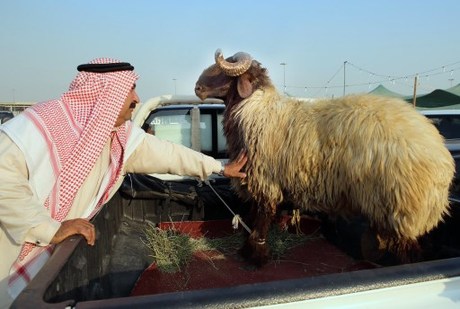Holy Quran Sura Hajj 37: From your sacrifice of animals Allah swt will not receive its meets or fleshes but He would receive your submission.
From Imam Al-Kazim (as) said: Holy Prophet said to Umme Salamah when she said Oh Prophet of Allah (sws) when Eid Al-azha comes some time we do not have anything to sacrifice shall I borrow and sacrifice? Holy Prophet (sws) said yes borrow for this cause surely it’s a loan which will be covered by Allah swt.
Sacrifice is done in several ways.
The first type of sacrifice that becomes obligatory during the Hajj ceremony and every pilgrim must sacrifice a sheep or a camel or a cow with special conditions.
The second type is related to the Kaffara of Hajj, in order to atone for some of the deeds that they performed during ihram.
The third type: The Qurbani which becomes obligated based on the vow (Nazar) means that he vows to sacrifice a sheep, a cow or a camel if the patient is healed.
But there is also a kind of sacrifice and that kind is recommended. Its explanation is that on the day of Eid al-Adha, every year, whether for a pilgrim or a non-pilgrim, whether in Mina or in the cities, it is mustahab to sacrifice a sheep, which is called in the Arabic language Azhiyah, And in Islam
Its recommendation has been emphasized in the holy Shari’a in such a way that some jurists (Ulamah) have considered it obligatory and God will certainly pay that debt. And its conditions are the same as the conditions of the obligatory Qurbani.
The days of Qurbani are four days for one who is in Mina, the first of which is Eid al-Adha, and three days for one who is in the cities. A kind of recommended sacrifice is also performed for a newborn child called aqeeqah and it has been emphasized a lot.
In verse 107 of Surah As-Saaffat, it is stated: “وَفَدَيْنَاهُ بِذِبْحٍ عَظِيمٍ” which means that something should be placed as a deterrent and repulsion of harm from a person or something else, and therefore the Kaffarah that some patients give instead of fasting. It is called fidyah (to cover Qaza fasting).
Therefore, it can be justified for all types of Qurbani:
First, for the person who makes the sacrifice, it is the elimination of calamity and the repulsion of loss of property and life.
Secondly, these sacrifices, as its name suggests, bring man closer to God, as it is stated in verse 37 of Surah Hajj that the flesh and blood of the sacrifice do not reach God, but your piety reaches God, and this is the closeness that comes from the sacrifice. God Almighty gets a person.
Thirdly, there is a narration that: Abi Basir quotes from Imam Sadig (as) that I asked him what the reason for sacrificing is? He said, “Indeed, the Qurbani sheds the sins of his master and causes their forgiveness. When the first drop of his blood falls on the earth, God knows from the unseen who fears from him and observes piety.”(Ref: Wasae-lu-Shia Shaikh Hurr Ameli Vol:10 pg 174).

